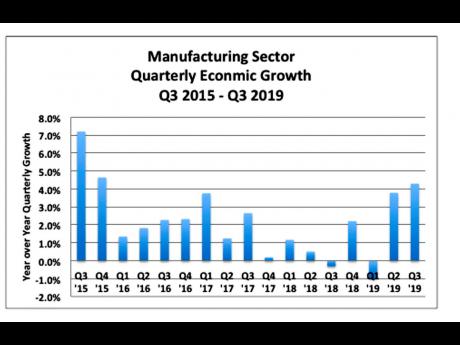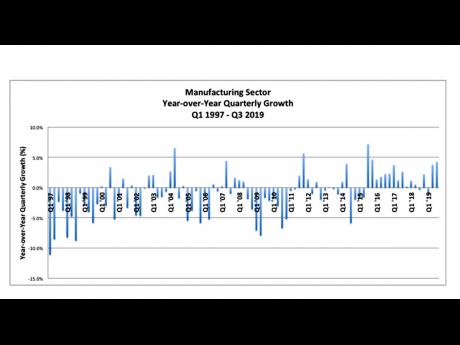Renaissance of Ja’s manufacturing sector
The manufacturing sector of the economy has been experiencing the most robust and consistent period of growth of any period in at least 25 years. The sector has experienced year-over-year quarterly economic growth for every quarter over the past four years with the exception of only two. There is no other period in the last quarter-century where the manufacturing sector has performed as consistently or as strongly. Furthermore, there is no other sector of the goods-producing side of the economy that has performed as consistently as manufacturing, over this four-year period.
These facts have been masked by the volatility of agriculture and mining. Due to external shocks, agriculture and mining have experienced several quarters of strong double-digit growth and other quarters of heavy double-digit decline. The Government of Jamaica (GOJ) is implementing projects to improve irrigation and storage capacity to alleviate volatility in agriculture output. Mining firms are investing in retooling their plants and upgrading capacity to be better positioned to absorb international commodity price swings.
In the meantime, the manufacturing sector constitutes only 8.7 per cent of the economy and, as a result, its average quarterly growth of 2.2 per cent over the last four years has not been sufficient to substantially compensate for the variability in other areas of the economy.
As such, the recent consistent positive performance of the manufacturing sector has largely gone unnoticed. This may be because we are still psychologically rooted in the traumatic experience of the gutting of Jamaica’s productive capacity over much of the past 25 years, beginning in the mid-1990s.
Historical decimation of the manufacturing base
Jamaica’s decades of macro-economic instability contributed to a dramatic reduction in the manufacturing base of the economy. The unsustainable fiscal and monetary policies of the 1990s, the high interest rate regime, the banking failure crisis, and the economic collapse that followed led to a decimation of the manufacturing production base from which Jamaica has not yet recovered. Between the end of 1996 and the end of 1999, the manufacturing sector contracted for 12 consecutive quarters. The impact of the global recession on a highly indebted Jamaica also had a deleterious impact on this sector. Between the third quarter of 2008 and the first quarter of 2011, the manufacturing sector declined for 11 straight quarters.
As a result, by the beginning of 2016, output from the manufacturing sector was only 70 per cent of its value in real terms compared with manufacturing output two decades earlier in 1996. By comparison, the output from tourism was 170 per cent higher in 2016 compared with tourism output in 1996 in real terms.
Promising growth in manufacturing today
However, since the end of 2015 the manufacturing sector has grown consistently. No doubt, increasing demand resulting from employment growth, reductions in interest rates, improved access to credit and improvements in the ease of doing business are among the factors that account for this. These improvements in the domestic environment have been underpinned by sustainable fiscal policies over the past seven years that have reversed decades of crowding out of the private sector.
The Statistical Institute of Jamaica (STATIN) recently reported that the manufacturing sector grew by 4.3 per cent in the third quarter of 2019 as compared with the third quarter of 2018. This follows growth of 3.8 per cent for the second quarter of 2019 over the second quarter of 2018. Cumulatively, manufacturing output was approximately 10 per cent higher in September 2019 over its level in December 2015 in real terms.
This is very encouraging. However, the output from the manufacturing sector in 2019 was still lower in real terms than a quarter-century ago in 1996. Much work therefore remains to be done.
Looking forward, capitalising on this renaissance
Manufacturing is important to Jamaica as the process of converting raw material into finished product through the application of technology, the employment of capital equipment, and the engagement of labour, delivers substantial economic value-add. Manufacturing, therefore, has a tremendous capacity to impact and sustain economic and employment growth.
While Jamaica’s fiscal incentive regime does not prefer one sector over another, the GOJ is firmly of the view that Jamaica has great potential in manufacturing and this sector is strategically important for Jamaica’s growth and employment ambitions.
Small and medium-size enterprises (SMEs) continue to be a significant component of Jamaica’s manufacturing sector. The GOJ is, therefore, focused on policies that can improve SMEs’ access to finance, training and penetration of markets.
In addition, two decades of consistent growth in tourism creates an attractive market for domestic manufactured goods. The GOJ is pursuing initiatives to deepen the linkage between our manufacturing sector and the hotels.
While the manufacturing sector is varied in composition, agro-processing constitutes a fair proportion. There is an opportunity for backward integration within this sub-sector of manufacturing, for example, profitably replacing imported raw materials such as mango and other fruit purée with domestic substitutes. The Ministry of Commerce, Industry, Agriculture and Fisheries (MICAF) is working with entrepreneurs and businesses to capture this opportunity.
Within the agro-processing sub-sector of manufacturing substantial opportunity exists with the School Feeding Programme. MICAF, with the support of the Food and Agriculture Organization of the United Nations, is pursuing the development of a home-grown school-feeding programme. This will improve nutrition for our children and build wealth among small farmers and the manufacturing sector through food processing.
Improvements in the business environment enable all businesses. In particular, the manufacturing sector interfaces with government at (i) border-control agencies in the importation of raw material and/or export of finished product; (ii) regulatory authorities that grant permits and approvals; and (iii) tax authorities in paying taxes and verifying compliance, among other areas.
The GOJ is working assiduously to improve the efficiency of these engagements by redefining processes that lead to simplification. The GOJ is also pursuing greater application of technology and online access and processing that saves time and money.
Manufacturers require space to operate. Private-sector warehouse developers are responding to the demand with new warehouse product. The GOJ’s Factories Corporation of Jamaica is also implementing plans to make space available for our small manufacturers who require expansion options.
Commendation to Manufacturing Businesses and Entrepreneurs
After decades of decline, the manufacturing sector is experiencing a renaissance with consistent increases in output. Government policy is only one part of the equation, however. Commendation belongs to manufacturing businesses and entrepreneurs in the manufacturing space who have taken the risk to invest, to retool, to hire and to expand.
The GOJ is committed to working with all of these manufacturers, with the umbrella Jamaica Manufacturers and Exporters Association, and with other stakeholders to continue to implement policies that ensure this renaissance becomes entrenched to the benefit of all Jamaicans.
- Audley Shaw is minister of industry, commerce, agriculture and fisheries and member of parliament for North East Manchester.
- Nigel Clarke is minister of finance and the public service and member of parliament for St Andrew North Western.




